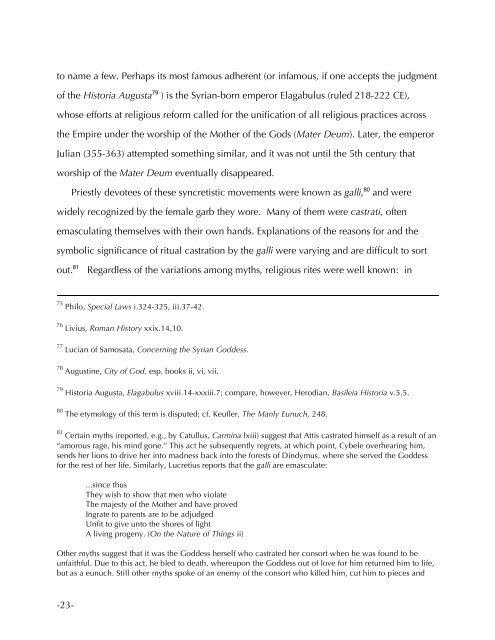-1- Eunuchs and the Postgender Jesus: Matthew 19:12 and ...
-1- Eunuchs and the Postgender Jesus: Matthew 19:12 and ...
-1- Eunuchs and the Postgender Jesus: Matthew 19:12 and ...
Create successful ePaper yourself
Turn your PDF publications into a flip-book with our unique Google optimized e-Paper software.
to name a few. Perhaps its most famous adherent (or infamous, if one accepts <strong>the</strong> judgment<br />
of <strong>the</strong> Historia Augusta 79 ) is <strong>the</strong> Syrian-born emperor Elagabulus (ruled 218-222 CE),<br />
whose efforts at religious reform called for <strong>the</strong> unification of all religious practices across<br />
<strong>the</strong> Empire under <strong>the</strong> worship of <strong>the</strong> Mo<strong>the</strong>r of <strong>the</strong> Gods (Mater Deum). Later, <strong>the</strong> emperor<br />
Julian (355-363) attempted something similar, <strong>and</strong> it was not until <strong>the</strong> 5th century that<br />
worship of <strong>the</strong> Mater Deum eventually disappeared.<br />
-23-<br />
Priestly devotees of <strong>the</strong>se syncretistic movements were known as galli, 80 <strong>and</strong> were<br />
widely recognized by <strong>the</strong> female garb <strong>the</strong>y wore. Many of <strong>the</strong>m were castrati, often<br />
emasculating <strong>the</strong>mselves with <strong>the</strong>ir own h<strong>and</strong>s. Explanations of <strong>the</strong> reasons for <strong>and</strong> <strong>the</strong><br />
symbolic significance of ritual castration by <strong>the</strong> galli were varying <strong>and</strong> are difficult to sort<br />
out. 81 Regardless of <strong>the</strong> variations among myths, religious rites were well known: in<br />
75 Philo, Special Laws i.324-325, iii.37-42.<br />
76 Livius, Roman History xxix.14,10.<br />
77 Lucian of Samosata, Concerning <strong>the</strong> Syrian Goddess.<br />
78 Augustine, City of God, esp. books ii, vi, vii.<br />
79 Historia Augusta, Elagabulus xviii.14-xxxiii.7; compare, however, Herodian, Basileia Historia v.5.5.<br />
80 The etymology of this term is disputed; cf. Keufler, The Manly Eunuch, 248.<br />
81 Certain myths (reported, e.g., by Catullus, Carmina lxiii) suggest that Attis castrated himself as a result of an<br />
“amorous rage, his mind gone.” This act he subsequently regrets, at which point, Cybele overhearing him,<br />
sends her lions to drive her into madness back into <strong>the</strong> forests of Dindymus, where she served <strong>the</strong> Goddess<br />
for <strong>the</strong> rest of her life. Similarly, Lucretius reports that <strong>the</strong> galli are emasculate:<br />
...since thus<br />
They wish to show that men who violate<br />
The majesty of <strong>the</strong> Mo<strong>the</strong>r <strong>and</strong> have proved<br />
Ingrate to parents are to be adjudged<br />
Unfit to give unto <strong>the</strong> shores of light<br />
A living progeny. (On <strong>the</strong> Nature of Things ii)<br />
O<strong>the</strong>r myths suggest that it was <strong>the</strong> Goddess herself who castrated her consort when he was found to be<br />
unfaithful. Due to this act, he bled to death, whereupon <strong>the</strong> Goddess out of love for him returned him to life,<br />
but as a eunuch. Still o<strong>the</strong>r myths spoke of an enemy of <strong>the</strong> consort who killed him, cut him to pieces <strong>and</strong>


